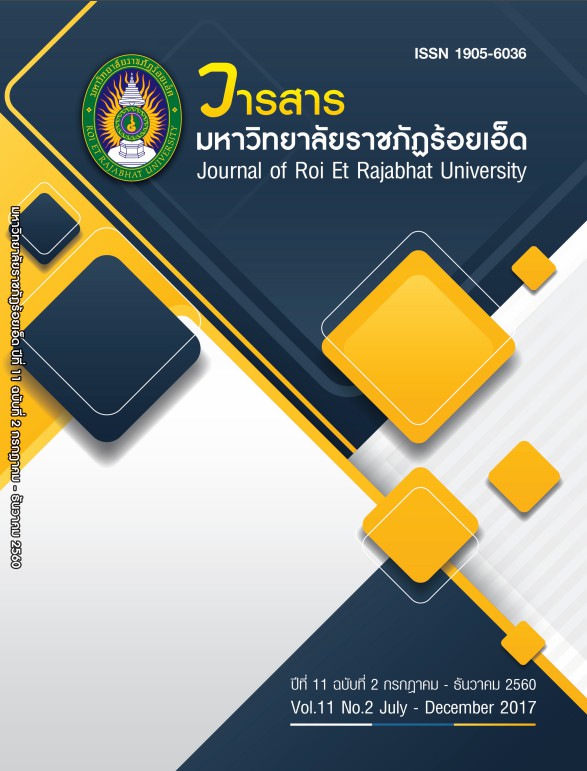Development of Learning Activities to Promote English Vocabulary Retention for Mattayomsuksa 3 Students through STAD Co-operative Learning Techniques
Keywords:
Learning Achievement, English Vocabulary, STAD technique, Co-operative LearningAbstract
The objectives of this research were to 1) develop learning activities to promote Matthayomsuksa
3 students’ English vocabulary retention through STAD co-operative learning techniques to meet the criteria
of 80/80, 2) examine the effectiveness index of the developed learning activities, 3) study English vocabulary
retention promoted through Student Teams-Achieve Division (STAD) co-operative learning techniques, and
4) explore the students’ satisfaction of the developed learning activities. The target group was 11 students
at Ban Mailoa (Kururachpattana) School under the Office of Roi Et Primary Educational Service Area 1.
The research instruments included 1) lesson plans for English learning activities based on STAD co-operative
learning techniques, 2) multiple choice quizzes (10 items, 9 series), 3) learning achievement tests for English
vocabulary retention constructed by the researcher (multiple choice, 40 items with a discrimination of
distribution of 0.26-0.79 and a reliability of 0.8379), and 4) a satisfaction test of the developed learning
activities ( a 5-Likert rating scale survey with 17 items and a discrimination of 0.2861-0.6252 and a reliability
of 0.8715. The statistics used in data analysis were percentage, means, standard deviation, and hypothesis
tests (Dependent Samples t–test). The research revealed that:
1. The developed learning activities to promote English vocabulary retention through STAD
co-operative learning techniques met the criteria of 81.92 / 80.45.
2. The effectiveness index of the developed learning activities was 0.5590
3. The target students particularly taught by the developed learning activities showed no
differences in the mean scores from the post-test and the retention test.
4. The target students expressed a “high” level of satisfaction of the developed learning activities
to promote English vocabulary retention based on STAD co-operative learning techniques.
References
ของนักเรียนชั้นมัธยมศึกษาปีที่ 1. วิทยานิพนธ์ ค.ม. (สาขาหลักสูตรและการสอน). บัณฑิตวิทยาลัย มหาวิทยาลัย
มหาสารคาม .
กระทรวงศึกษาธิการ. (2551). หลักสูตรแกนกลางการศึกษาขั้นพื้นฐาน พุทธศักราช 2551. กรุงเทพฯ: โรงพิมพ์ชุมนุม
สหกรณ์การเกษตรแห่งประเทศไทย จากัด.
จุฑารัตน์ สุจินพรม. (2546). การพัฒนาแผนการจัดการเรียนรู้ เรื่องกระบวนการในการดารงชีวิตของพืชกลุ่ม สาระการเรียนรู้
วิทยาศาสตร์ ชั้นมัธยมศึกษาปีที่ 1 โดยการเรียนรู้แบบกลุ่มร่วมมือที่ประสบความสาเร็จเป็นทีม (STAD).
การศึกษาค้นคว้าอิสระ กศ.ม. (หลักสูตรและการสอน) บัณฑิตวิทยาลัย มหาวิทยาลัยมหาสารคาม .
ฐาปนี สิงห์นันท์. (2557). การพัฒนาความสามารถในการอ่านภาษาอังกฤษเพื่อความเข้าใจโดยใช้วิธีการเรียนรู้แบบร่วมมือ
เทคนิค STAD และแผนที่ความคิด ของนักเรียนชั้นมัธยมศึกษาปีที่ 3. วิทยานิพนธ์ ค.ม. (สาขาหลักสูตรและการสอน)
มหาสารคาม: บัณฑิตวิทยาลัยมหาวิทยาลัยราชภัฏมหาสารคาม.
บุณยภัทร สมเพชร. (2553). ผลการจัดการเรียนรู้แบบร่วมมือเทคนิค STAD กลุ่มสาระการเรียนรู้ภาษาไทย เรื่องการอ่าน
จับใจความสาคัญ ชั้นประถมศึกษาปีที่ 2 โรงเรียนบ้านวังผา สานักงานเขตพื้นที่การศึกษาเชียงราย เขต 2.
ปริญญานิพนธ์ ศศ.ม. เชียงราย: มหาวิทยาลัยราชภัฏเชียงราย.
โรงเรียนบ้านไม้ล่าว (คุรุราษฎร์พัฒนา). (2557). รายงานผลสัมฤทธิ์ทางการเรียนปีการศึกษา 2557. ร้อยเอ็ด: ฝ่ายวิชาการ
โรงเรียนบ้านไม้ล่าว .
วงเดือน ปอศิริ. (2546). ผลสัมฤทธิ์ทางการเรียนวิชาภาษาอังกฤษ ของนักเรียนชั้นประถมศึกษาปีที่ 5 ที่ได้รับการสอน
โดยใช้รูปแบบการสอนแบบร่วมมือกันเรียนรู้. วิทยานิพนธ์ ศษ.ม. (การประถมศึกษา) ขอนแก่น: บัณฑิตวิทยาลัย
มหาวิทยาลัยขอนแก่น.
Robert E Slavin. (1990). Cooperative Learning. Review of Educational Research. 50(2) : 319–320 ; Summer
Downloads
Published
How to Cite
Issue
Section
License
บทความที่ได้รับการตีพิมพ์เป็นลิขสิทธิ์ของวารสารมหาวิทยาลัยราชภัฎร้อยเอ็ด
ข้อความที่ปรากฏในบทความแต่ละเรื่องในวารสารวิชาการเล่มนี้เป็นความคิดเห็นส่วนตัวของผู้เขียนแต่ละท่านไม่เกี่ยวข้องกับมหาวิทยาลัยราชภัฎร้อยเอ็ด และคณาจารย์ท่านอื่นๆในมหาวิทยาลัยฯ แต่อย่างใด ความรับผิดชอบองค์ประกอบทั้งหมดของบทความแต่ละเรื่องเป็นของผู้เขียนแต่ละท่าน หากมีความผิดพลาดใดๆ ผู้เขียนแต่ละท่านจะรับผิดชอบบทความของตนเองแต่ผู้เดียว





